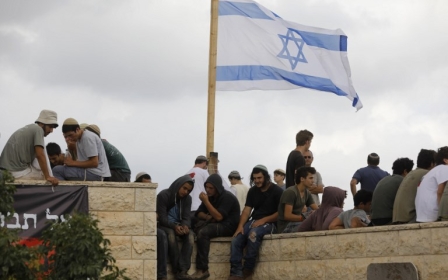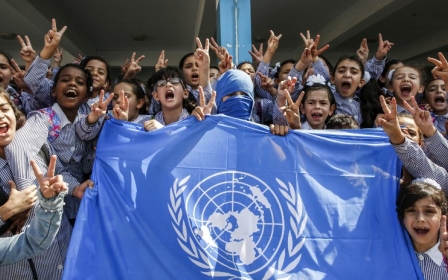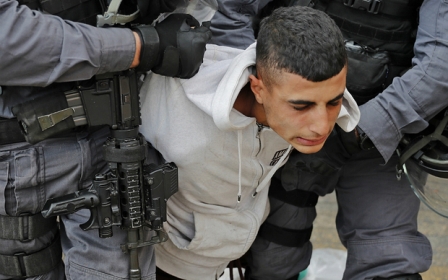Trump says he wants two-state solution for Israeli-Palestinian conflict
US President Donald Trump said on Wednesday that he wanted a two-state solution to the Israeli-Palestinian conflict, the clearest expression yet of his administration's support for such an outcome.
The Trump administration has in the past said it would support a two-state solution if both sides agreed to it.
Trump, in a meeting with Israeli Prime Minister Benjamin Netanyahu on the sidelines of the UN General Assembly, also said he wanted to unveil a peace plan in the next two to three months.
"It is a dream of mine to get that done prior to the end of my first term," Trump said.
After taking office, Trump appeared to break the conventional US commitment to a two-state solution as the only viable option, saying he could "live with" whichever option both parties agreed to.
Netanyahu said he was not surprised by Trump's stance, according to Israeli media reports.
He said, however, that he expected Trump to accept the Israeli interpretation of a two-state solution, which may mean continued Israeli security control "west of Jordan".
Palestinian leaders have rejected Trump as a peace broker because of his aggressive pro-Israel policies.
Since taking office in 2017, Trump has moved the US embassy to Jerusalem, declaring the Holy city as Israel's capital; pulled the US out of the UN cultural body UNESCO, accusing it of "anti-Israel bias"; withdrew from the UN Human Rights Council over its criticism of Israeli policies, and cut funding for the UN Relief and Works Agency for Palestine Refugees (UNRWA).
Washington also suspended $25m in aid for hospitals that serve Palestinians in East Jerusalem, which was illegally annexed by Israel in 1982.
Earlier this month, the White House closed the Palestine Liberation Organisation's office in Washington to put pressure on Palestinians who are seeking to refer Israel's violations to the International Criminal Court.
Trump said the Palestinians would begin negotiating soon and "Israel will have to do something good for the other side".
Palestinian Authority President Mahmoud Abbas's spokesman, Nabil Abu Rudeineh, stressed that a two-state solution must be based on the 1967 borders, before the Israeli military occupied Gaza and the West Bank.
"The road to peace requires the two-state solution, a Palestinian state in the '67 borders with East Jerusalem as its capital," he was quoted as saying by official Palestinian news agency WAFA.
In 2011, when then-US President Barack Obama called for a Palestinian state within the 1967 borders, Israeli leaders rebuked him.
"Israel cannot return to the indefensible 1967 borders," Netanyahu said then.
Husam Zomlot, head of the recently closed Palestinian mission in Washington, said Trump's policies have been destroying the prospect of a two-state solution.
"Their words go against their actions and their action is absolutely clear [and] is destroying the possibility of the two-state solution," Zomlot told AFP.
French President Emmanuel Macron also said at the UN General Assembly on Wednesday that there is "no credible alternative" to the two-state solution.
Trump had vowed to succeed where his predecessors failed in solving the Israeli-Palestinian conflict, but his peace proposal dubbed the "deal of the century" has been rejected by Palestinians even before it has been officially released.
The plan reportedly offers Palestinians a provisional government without Jerusalem, while keeping major Israeli settlements that spread across vast parts of the West Bank.
"The plan calls for having a Palestinian state with provisional borders on half of the West Bank and the Gaza Strip, without Jerusalem, and calls for humanitarian solutions to the refugee issue," a Palestinian official told MEE in March.
Critics of the two-state solution argue that it is no longer viable because of Israel's ongoing colonisation of the West Bank, where about 400,000 settlers live under Israeli law and use separate education and transport systems in what legal scholars say amounts to a policy of apartheid.
There are also about 200,000 settlers in East Jerusalem, the section of the Holy city that Palestinians want as their capital.
Middle East Eye propose une couverture et une analyse indépendantes et incomparables du Moyen-Orient, de l’Afrique du Nord et d’autres régions du monde. Pour en savoir plus sur la reprise de ce contenu et les frais qui s’appliquent, veuillez remplir ce formulaire [en anglais]. Pour en savoir plus sur MEE, cliquez ici [en anglais].




